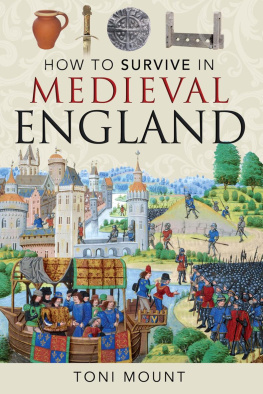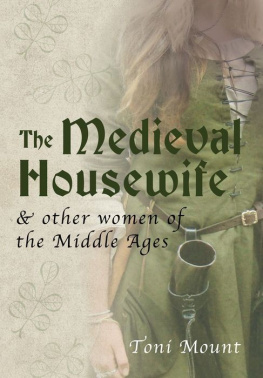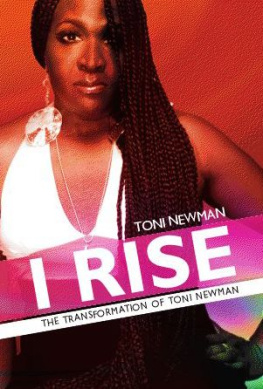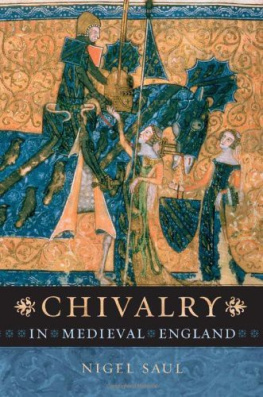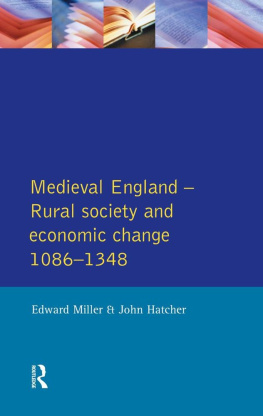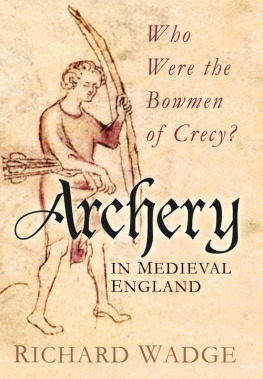HOW TO SURVIVE IN
MEDIEVAL ENGLAND
For Elliot Samuel Mount
The youngest member of the family
And so the most likely to have the chance to become a time-traveller
HOW TO SURVIVE IN
MEDIEVAL ENGLAND
TONI MOUNT
First published in Great Britain in 2021 by
PEN AND SWORD HISTORY
An imprint of
Pen & Sword Books Ltd
Yorkshire Philadelphia
Copyright Toni Mount,
ISBN 978 1 52675 441 7
eISBN 978 1 52675 442 4
Mobi ISBN 978 1 52675 443 1
The right of Toni Mount to be identified as Author of this work has been asserted by him in accordance with the Copyright, Designs and Patents Act 1988.
A CIP catalogue record for this book is available from the British Library.
All rights reserved. No part of this book may be reproduced or transmitted in any form or by any means, electronic or mechanical including photocopying, recording or by any information storage and retrieval system, without permission from the Publisher in writing.
Pen & Sword Books Limited incorporates the imprints of Atlas,
Archaeology, Aviation, Discovery, Family History, Fiction, History, Maritime, Military,
Military Classics, Politics, Select, Transport, True Crime, Air World,
Frontline Publishing, Leo Cooper, Remember When, Seaforth Publishing,
The Praetorian Press, Wharncliffe Local History, Wharncliffe Transport,
Wharncliffe True Crime and White Owl.
For a complete list of Pen & Sword titles please contact
PEN & SWORD BOOKS LIMITED
47 Church Street, Barnsley, South Yorkshire, S70 2AS, England
E-mail:
Website: www.pen-and-sword.co.uk
Or
PEN AND SWORD BOOKS
1950 Lawrence Rd, Havertown, PA 19083, USA
E-mail:
Website: www.penandswordbooks.com
Contents
Chapter 1: Introduction
Setting the scene
Preparation for your journey
It is your duty to work
Chapter 2: Social Structure and Housing
Class structure How do the poor live?
Class structure How do the wealthy live?
Class structure How do the middling sort live?
Mind your language
Chapter 3: Beliefs and Religious Ideas
Work and holidays
Fasting
Sex
What would be my beliefs about death and the dead?
How would I deal with death?
How would I worship?
Chapter 4: Clothing and Appearance
Sumptuary Laws
What kind of clothes would I wear?
Lacings
Where would I get my clothes?
How would I look after them?
How would I look after my skin and hair?
Chapter 5: Food and Shopping
What would I eat?
Staple foods bread and ale
How would I cook the food?
How would I buy food and goods?
Money, weights and measures
Chapter 6: Health and Medicine
What diseases would I be most vulnerable to?
How healthy would I be?
What is my life expectancy?
How useful are physicians?
What is the difference between a physician and a surgeon?
Chapter 7: Work and Leisure
What is the attitude to work?
What kinds of jobs are available?
What kinds of jobs are available to women?
Femmes soles
What do women do if they have no job?
What entertainment is available?
How would I relax?
Chapter 8: Family Matters
Marriage
Divorce
How are women treated?
How are children treated?
How are children educated?
Pets
Chapter 9: Warfare
How often would I go to war?
What type of warfare would I practise?
Studying the art of war
What are my chances of survival?
How would I be treated as a veteran?
Chapter 10: Law and Order
How would I behave as a citizen?
How is the country policed?
The piepowder courts
How are criminals prosecuted?
Out on bail
Forest law
Oddities of the law
Conclusion
Notes
List of Illustrations
Suggested Further Reading
Chapter 1
Introduction
It may happen in my grandchildrens lifetimes, or those of their grandchildren, that mankind will learn the secrets of time-travel and Doctor Whos TARDIS becomes a reality. I have no idea what twenty-second century technology will be like. Perhaps books such as this wont exist and readers will simply choose a title, connect to it in some way, through the ether, and the entire text will be implanted into their minds for future reference. Personally, I prefer turning pages.
However mysterious our future may be, at least we know something about our past. This book is intended as a handy guide to the dos and donts for visitors to Medieval England: do be polite, dont drink the water, do wear rabbit fur, dont expect to eat with a fork, etc. How do you find your way around without GPS, Sat Nav or even signposts? Where can you get a decent meal; what will be served and how will it taste? What should you do if you meet royalty? If youre not well, who should you see about it? Where can you stay? What should you wear for a night on the town? How do you contact a friend or relative without social media or skype and no wi-fi to look up information? (For looking stuff up, Im afraid this book is all that will be available.) And most importantly, how do you get money to spend when there are no credit/ debit cards or cash points, or even banks?
You wont have any relatives: they havent been born yet, but you will definitely have living ancestors, if you can identify them.
Youll find the answers to these questions and many more here, produced in a user-friendly format you can take with you on your travels back to the Middle Ages (unless you downloaded it on Kindle, in which case, its only of use for as long as the battery remains charged).
Setting the Scene
Labourers working in fields.
Medieval England is an agricultural land. Depending upon the date of your visit, the scenery may be rather different. Back in 1066, when William the Conqueror defeated the last Anglo-Saxon king, Harold II, at the battle of Hastings, he found England a prosperous country the main reason he was so keen to become its king dotted with few towns but many villages and hamlets, each with its own three-field system, growing crops in rotation. This means the arable land is divided into three fields: one growing wheat, barley, oats or rye, depending on the soil type and local climate; one sown with peas and beans, which restore nutrients to the soil; and the third left fallow, to be grazed by livestock to add their manure to the earth. Each year the use of the field rotates, keeping them all fertile, and they are divided into strips, owned by each villager in such a way that everyone has a share of the best land and the poorest. Most houses come with a garden plot, where the household grows onions, cabbages, leeks and herbs. Every village has its common land, where the locals graze their animals, and often an orchard with apple, pear, plum and cherry trees. Here the beehives, or skeps, are kept, to ensure the bees pollinate the blossom to give a good harvest of fruit and to produce honey; the poor mans only sweetener. The village probably has areas of woodland as well, which supply timber for building, kindling for the fire, free nuts and berries in the autumn and pannage for pigs.



